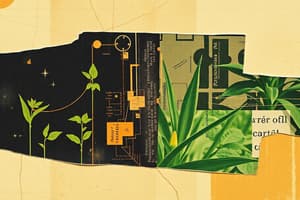Podcast
Questions and Answers
What is the primary function of ATP in cellular processes?
What is the primary function of ATP in cellular processes?
- To store glucose
- To act as an energy currency (correct)
- To transport oxygen
- To break down fats
The energy released during the breakdown of ATP is used for exothermic reactions in the cell.
The energy released during the breakdown of ATP is used for exothermic reactions in the cell.
False (B)
What process is used to create ATP from ADP and inorganic phosphate?
What process is used to create ATP from ADP and inorganic phosphate?
cellular respiration
The energy released when the terminal phosphate linkage in ATP is broken is approximately ______ kJ/mol.
The energy released when the terminal phosphate linkage in ATP is broken is approximately ______ kJ/mol.
Match the following descriptions with their corresponding terms:
Match the following descriptions with their corresponding terms:
What role do chloroplasts play in photosynthesis?
What role do chloroplasts play in photosynthesis?
Desert plants take up carbon dioxide during the day.
Desert plants take up carbon dioxide during the day.
What is chlorophyll and where is it found?
What is chlorophyll and where is it found?
The process of photosynthesis primarily occurs in the __________ of the plant.
The process of photosynthesis primarily occurs in the __________ of the plant.
Match the activities with their purposes in demonstrating chlorophyll's role in photosynthesis:
Match the activities with their purposes in demonstrating chlorophyll's role in photosynthesis:
Flashcards are hidden until you start studying
Study Notes
Photosynthesis and Chlorophyll
- Desert plants utilize carbon dioxide at night to prepare an intermediate, which chlorophyll acts upon during the day.
- Chloroplasts, containing chlorophyll, are identified as green organelles within leaf cross-sections.
- An experiment using variegated leaves demonstrates the necessity of chlorophyll for photosynthesis.
ATP and Cellular Respiration
- ATP (adenosine triphosphate) is the energy currency for cellular processes, synthesized during respiration.
- Energy released during ATP breakdown is approximately 30.5 kJ/mol, utilized for endothermic reactions within cells.
- ATP is pivotal for numerous cellular functions like muscle contraction, protein synthesis, and nervous impulse conduction.
Gas Exchange in Plants
- Stomata facilitate the exchange of oxygen and carbon dioxide in plants, ensuring all cells contact air through large intercellular spaces.
Blood and Circulatory System
- Blood is a fluid connective tissue comprising plasma, which carries nutrients, gases, and waste products.
- The heart functions as a muscular organ, preventing the mixing of oxygen-rich and carbon dioxide-laden blood.
Excretory System in Humans
- The human excretory system comprises kidneys, ureters, a urinary bladder, and a urethra that remove metabolic wastes.
- Kidneys filter blood to produce urine, which contains nitrogenous wastes like urea.
- Nephrons, the basic filtration units in kidneys, selectively reabsorb substances such as glucose and water.
Urine Formation
- Urine is stored in the urinary bladder until pressure induces a reflex to urinate, controlled by nervous impulses.
Kidney Function and Dialysis
- Proper kidney function is critical; damage may result from infections or reduced blood flow, leading to toxic waste accumulation.
- An artificial kidney (hemodialysis) serves to filter blood and eliminate nitrogenous waste in cases of kidney failure.
Studying That Suits You
Use AI to generate personalized quizzes and flashcards to suit your learning preferences.



